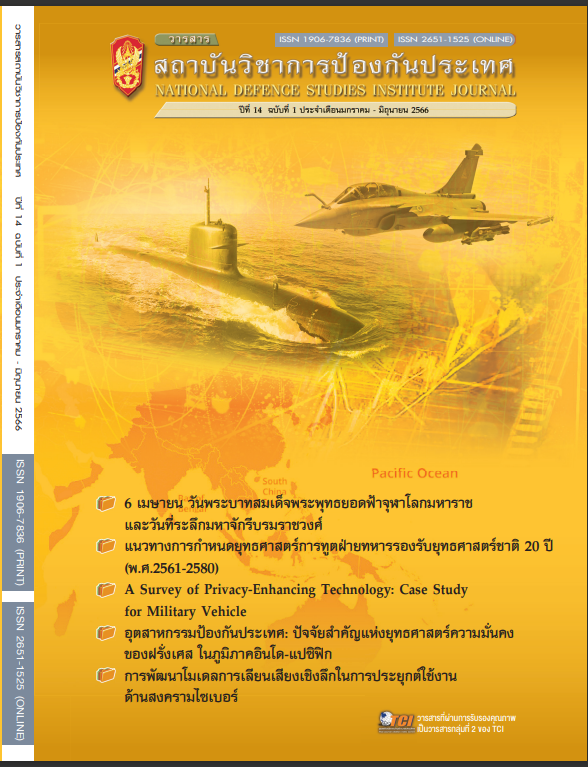“BASIC” Fundamentals of Digital Skill for Military Officers in Education Science
Main Article Content
Abstract
The purpose of this research was to design components and indicators of fundamentals of digital skill for military officers in education science. The research method used in-depth interviews with a sample of informants, which consisted of the education science for military officer’s curriculum supervising group, a group of teaching staff in military school, and a group of staff working as administrative officers of the education section in military school, totaling 7 people.
From the research results, the researcher was able to synthesize the meaning of the term "fundamental of digital skills" means A group of abilities in using computer technology for teaching, teaching support, and research. It consists of the following abilities: 1) basic computer configuration (B), 2) use of application software (A), 3) safe use of computer systems (S), 4) searching for information. (I) and 5) communication (C). In addition, the researcher can synthesize components and indicators of fundamentals of digital skill for military officers in educational science are 5 components consisting of 60 indicators which may be used as guidelines for developing a competency-based curriculum for military officers in education science.
Article Details

This work is licensed under a Creative Commons Attribution-NonCommercial-NoDerivatives 4.0 International License.
The articles, images, tables, graphs, written content, and opinions published in this journal are solely those of the authors and do not necessarily reflect the views or positions of the National Defence Studies Institute or its academic affiliates.
References
กองบัญชาการกองทัพไทย. (2561). คำสั่งกองทัพไทย ที่่ กห 87/2561 เรื่องทดลองใช้สายวิทยาการ สายงาน และหัวหน้าสายวิทยาการของ บก.ทท. 15 สิงหาคม 2561.
ชิโนรส กวางแก้ว, และรสริน เจิมไธสง. (2565). การจัดการเรียนรู้โดยใช้โครงงานเป็นฐานผสานกับกระบวนการคิดอย่างมีวิจารณญาณ เพื่อพัฒนาสมรรถนะการรู้เท่าทันดิจิทัล รายวิชาเทคโนโลยี สำหรับนักเรียนชั้นประถมศึกษาปีที่ 5. วารสารมนุษยศาสตร์และสังคมศาสตร์ มหาวิทยาลัยนครพนม, 12(3), 287-297.
สุชาดา สกลกิจรุ่งโรจน์. (2563). การสังเคราะห์ความหมาย องค์ประกอบ และตัวชี้วัดของทักษะการรู้ดิจิทัลสำหรับนักศึกษาระดับบัณฑิตศึกษามหาวิทยาลัยสุโขทัยธรรมาธิราช. วารสารอิเล็กทรอนิกส์การเรียนรู้ทางไกลเชิงนวัตกรรม, 10(1), 82-97.
สำนักงานคณะกรรมการดิจิทัลเพื่อเศรษฐกิจและสังคมแห่งชาติ. (2561). กรอบสมรรถนะด้านดิจิทัลของพลเมืองไทย. สืบค้นเมื่อ 20 ตุลาคม 2565, จาก https://web.parliament.go.th/assets/portals/1/files/digital_compettence_framework_for_thai_citizens.pdf
สำนักงานราชบัณฑิตยสภา. (2554). ทักษะ. สืบค้นเมื่อ 15 ตุลาคม 2563, จาก https://dictionary.orst.go.th
ราชบัณฑิตยสถาน. (2549).ศัพท์คอมพิวเตอร์และเทคโนโลยีสารสนเทศ ฉบับราชบัณฑิตสถาน (พิมพ์ครั้งที่ 7). กรุงเทพฯ: นานมีบุ๊คส์พับลิเคชั่นส์.
Beattie, E., Coupe, H., Terrell, T., Marshall, A., & Wilson, E. (2021). Digital Literacy Framework for Adult Learners. Retrieved July 3, 2020 from https://www.dllr.state.md.us/adultliteracy/digitalliteracyframework.pdf
Lei, Z., & Jing, Y. (2016). Study on Human Resource Reform in the Digital Transformation. In Bin, X.,Chen, Y.N. & Zhao, L. H. (Ed.), Proceedings of the 2016 Joint International Information Technology, Mechanical and Electronic Engineering, (p. 471–477). Xi'an, China Retrieved from https://doi.org/10.2991/JIMEC-16.2016.84
Mitchell, A. A. (2006). Introduction to Rubrics: An Assessment Tool to Save Grading Time, Convey Effective Feedback and Promote Student Learning. Journal of College Student Development, 47(3), 352–355. Retrieved from https://doi.org/10.1353/csd.2006.0033
Oxford Learner's Dictionaries. (n.d.). Digital. Retrieved October 15, 2020 from https://www.oxfordlearnersdictionaries.com/definition/english/digital_1?q=digital
Oxford Learner’s Dictionaries. (n.d.). Skill. Retrieved October 15, 2020 from https://www.oxfordlearnersdictionaries.com/definition/english/skill?q=skill
Reedy, K., & Goodfellow, R. (2012). Digital and information literacy framework. Retrieved October 20, 2020 from http://www.open.edu/openlearn/educationwww.open.edu/openlearn
Ryan, G. W., & Bernard, H. R. (2003). Techniques to Identify Themes. Field Methods, 15(1), 85-109. Retrieved from https://doi.org/10.1177/1525822X02239569
Schwertner, K. (2017). Digital Transformation of Business. Trakia Journal of Sciences, 15, 388-393. Retrieved from https://doi.org/10.15547/tjs.2017.s.01.065
South Suburban College. (2014). Technology skill rubric. Retrieved November 5, 2020 from https://www.ssc.edu/wp-content/uploads/2014/09/TechnologyRubric.pdf
UNESCO. (2018). A Global Framework of Reference on Digital Literacy Skills for Indicator 4.4.2. Retrieved November 10, 2020 from https://uis.unesco.org/sites/default/files/documents/ip51-global-framework-reference-digital-literacy-skills-2018-en.pdf
Vial, G. (2021). Understanding digital transformation: A review and a research agenda. Managing Digital Transformation, 13-66. Retrieved from https://doi.org/10.4324/9781003008637-4
Vuorikari, R., Punie, Y., Carretero, G. S., & Van, D. B. G. (2016). DigComp 2.0: The Digital Competence Framework for Citizens. Retrieved November 10, 2020 from https://doi.org/10.2791/607218


